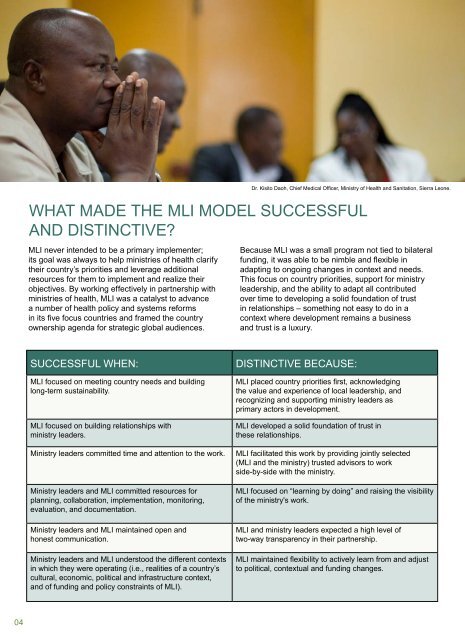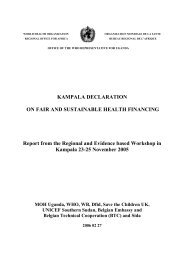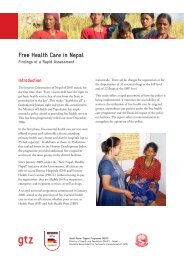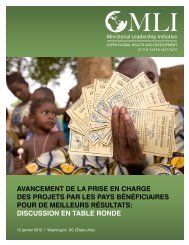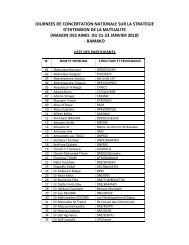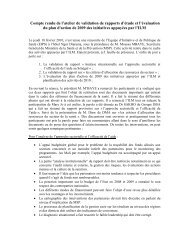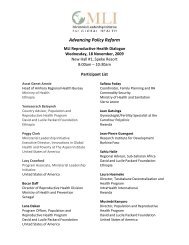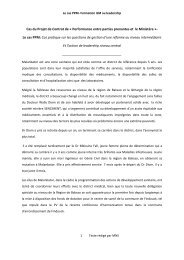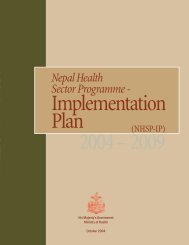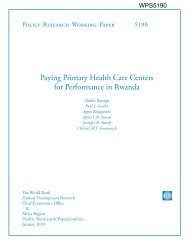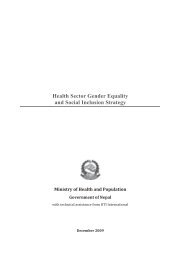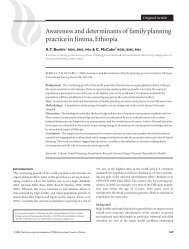the mli model for advancing country ownership - Ministerial ...
the mli model for advancing country ownership - Ministerial ...
the mli model for advancing country ownership - Ministerial ...
Create successful ePaper yourself
Turn your PDF publications into a flip-book with our unique Google optimized e-Paper software.
What made <strong>the</strong> MLI Model successful<br />
and distinctive?<br />
MLI never intended to be a primary implementer;<br />
its goal was always to help ministries of health clarify<br />
<strong>the</strong>ir <strong>country</strong>’s priorities and leverage additional<br />
resources <strong>for</strong> <strong>the</strong>m to implement and realize <strong>the</strong>ir<br />
objectives. By working effectively in partnership with<br />
ministries of health, MLI was a catalyst to advance<br />
a number of health policy and systems re<strong>for</strong>ms<br />
in its five focus countries and framed <strong>the</strong> <strong>country</strong><br />
<strong>ownership</strong> agenda <strong>for</strong> strategic global audiences.<br />
Dr. Kisito Daoh, Chief Medical Officer, Ministry of Health and Sanitation, Sierra Leone.<br />
Because MLI was a small program not tied to bilateral<br />
funding, it was able to be nimble and flexible in<br />
adapting to ongoing changes in context and needs.<br />
This focus on <strong>country</strong> priorities, support <strong>for</strong> ministry<br />
leadership, and <strong>the</strong> ability to adapt all contributed<br />
over time to developing a solid foundation of trust<br />
in relationships – something not easy to do in a<br />
context where development remains a business<br />
and trust is a luxury.<br />
Successful when:<br />
MLI focused on meeting <strong>country</strong> needs and building<br />
long-term sustainability.<br />
MLI focused on building relationships with<br />
ministry leaders.<br />
Ministry leaders committed time and attention to <strong>the</strong> work.<br />
Ministry leaders and MLI committed resources <strong>for</strong><br />
planning, collaboration, implementation, monitoring,<br />
evaluation, and documentation.<br />
Ministry leaders and MLI maintained open and<br />
honest communication.<br />
Ministry leaders and MLI understood <strong>the</strong> different contexts<br />
in which <strong>the</strong>y were operating (i.e., realities of a <strong>country</strong>’s<br />
cultural, economic, political and infrastructure context,<br />
and of funding and policy constraints of MLI).<br />
Distinctive because:<br />
MLI placed <strong>country</strong> priorities first, acknowledging<br />
<strong>the</strong> value and experience of local leadership, and<br />
recognizing and supporting ministry leaders as<br />
primary actors in development.<br />
MLI developed a solid foundation of trust in<br />
<strong>the</strong>se relationships.<br />
MLI facilitated this work by providing jointly selected<br />
(MLI and <strong>the</strong> ministry) trusted advisors to work<br />
side-by-side with <strong>the</strong> ministry.<br />
MLI focused on “learning by doing” and raising <strong>the</strong> visibility<br />
of <strong>the</strong> ministry's work.<br />
MLI and ministry leaders expected a high level of<br />
two-way transparency in <strong>the</strong>ir partnership.<br />
MLI maintained flexibility to actively learn from and adjust<br />
to political, contextual and funding changes.<br />
04


